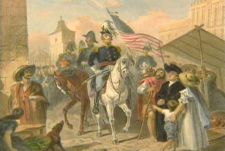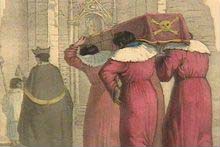The Aftermath of War
The War Between the United States and Mexico
by Robert Ryal Miller
California State University, Hayward
 General Scott Entering Mexico City
General Scott Entering Mexico CitySpecial Collections Division, The University of Texas at Arlington
What did the Mexican War mean to Americans in the mid-19th century? The answer reflects the nature and character of mid-century America itself. Americans were reaching out beyond their border. Advancements in transportation and communications technologies were dissolving the nation's geographic and cultural isolation. Commerce expanded and travel increased as interest in exploration carried Americans around the globe. The war was a "window" through which Americans saw a strange and exotic land of alien manners, customs, and attitudes. Many were convinced that America would never be the same.
The U.S.-Mexican War had a tremendous impact on the history of both countries. For the United States, this was the nation's first foreign war fought almost entirely on foreign territory. It involved multiple armies, long supply lines, a very large-scale amphibious landing of troops, and it provided the first experience of occupying a foreign capital and establishing a military government for an alien population. But the war was divisive for the northern republic, exacerbated by the slavery issue and by factious politics in Washington. Another negative factor was the cost in human lives that was deeply felt by the survivors for many years — more than 5,800 Americans were killed or wounded in battle, and 11,000 soldiers died from diseases, in addition to others who succumbed from their war injuries soon after being mustered out of service. The enormous financial cost, estimated at more than $75 million, was another negative factor.
Some unpleasant aspects of the war were offset in the United States by the exhilarating effect of a string of military victories and the acquisition of half a million miles of territory. The discovery of rich gold and silver deposits in California and Nevada was an unexpected bonanza that greatly contributed to the national economy and to the westward movement of the population. Although this new territory made the United States a continental power and provided fine ports on the Pacific coast, it also upset the balance between free and slave states, which helped bring on the catastrophe of the American Civil War.
 For Mexico, the war was a series of tragedies. Besides the thousands of military and civilian deaths directly attributed to battles, the war left tens of thousands of orphans, widows and cripples. Artillery shelling and small-arms gunfire caused extensive destruction to buildings in a number of cities, in addition to damage to port facilities and roads. The naval blockade and movement of thousands of troops across the land severely affected the economy, disrupting internal and external trade, and the massive conscription of peasants caused a steep decline in agricultural and mineral production. The war also destroyed or upset political careers and caused chaos in the national government — there were seven presidents and 10 different ministers of foreign relations during the two years of war. The political instability during and immediately after the war led to a new despotic regime and eventually to another civil war.
For Mexico, the war was a series of tragedies. Besides the thousands of military and civilian deaths directly attributed to battles, the war left tens of thousands of orphans, widows and cripples. Artillery shelling and small-arms gunfire caused extensive destruction to buildings in a number of cities, in addition to damage to port facilities and roads. The naval blockade and movement of thousands of troops across the land severely affected the economy, disrupting internal and external trade, and the massive conscription of peasants caused a steep decline in agricultural and mineral production. The war also destroyed or upset political careers and caused chaos in the national government — there were seven presidents and 10 different ministers of foreign relations during the two years of war. The political instability during and immediately after the war led to a new despotic regime and eventually to another civil war.
The most lasting effect of the war on Mexicans was psychological. A tragic loss of soldiers and battles, the humiliation of having their capital and much of the country occupied by enemy troops, and the ignominy of a peace treaty that alienated half of the national territory (counting Texas) was a severe blow. It shattered a sense of national honor and dignity, and it engendered a deep and long-lasting feeling of resentment toward Yankees. Mexicans continue to lament the consequences of the war that they call "the American Intervention."





